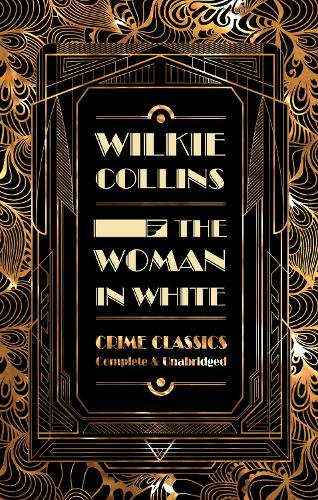
The Woman in White
(Hardback, New edition)
Available Formats
Hardback
Published: 29th November 1991
Paperback
Published: 7th January 2013
Paperback
Published: 5th May 2003
Paperback
Published: 15th January 2002
Hardback
Published: 28th September 2009
Hardback
Published: 30th January 2018
Hardback, New edition
Published: 15th March 2020
Paperback
Published: 4th January 2018
Paperback
Published: 5th May 2008
Paperback
Published: 8th December 2011
Paperback
Published: 12th December 2022
Paperback
Published: 1st January 2016
Publishing Details
The Woman in White
By (Author) Wilkie Collins
Contributions by Judith John
Contributions by Martin Edwards
Flame Tree Publishing
Flame Tree Publishing
15th March 2020
New edition
United Kingdom
Classifications
General
Fiction
823.8
Physical Properties
Hardback
864
Width 93mm, Height 150mm, Spine 43mm
Description
Generally regarded as the first successful crime and mystery novel, on publication in 1860 it was exceptionally popular with public and critics alike. Based on a real case, Collins weaves an intriguing tale of mystery, asylums and mistaken identity that continues to grip the sophisticated modern reader. New Glossary and biography. The FLAME TREE COLLECTABLE CRIME CLASSICS are chosen to create a delightful and timeless home library of classic crime and mystery thrillers. Each stunning unabridged edition features deluxe cover treatments, ribbon markers, luxury endpapers and gilded edges. The Woman in White, along with Collins other masterpiece The Moonstone) is generally regarded as the first successful crime and mystery novel. On publication in 1860 it caused a sensation and was exceptionally popular with public and critic alike. Based on a real 18th century case of abduction Collins weaves an intriguing tale of mystery, asylums and mistaken identity that continues to grip the sophisticated modern reader. A specially commissioned biography of the author and a glossary of Victorian and Literary terms make this new edition essential for all classic crime fans! AUTHOR: Considered by many as the founder of the crime novel, William Wilkie Collins (1824-89) was, unlike many nineteenth-century writers, a great literary success within his own lifetime. At one stage he rose to be the highest-paid Victorian writer, even eclipsing the earnings of his mentor, Charles Dickens. He had several careers in his youth, but it was writing novels that brought him fame, boosted by a certain notoriety for what many perceived as his scandalous and immoral private life. SELLING POINTS: . Deluxe foiled and embossed cover, with gilded edges. . Gift editions of much-loved crime classics. . Accessible and timeless unabridged text. . Features a glossary of Victorian and Literary terms. Hardback Deluxe edition, foiled and embossed, with gilded edges.
Author Bio
Considered by many as the founder of the crime novel, William Wilkie Collins (182489) was, unlike many nineteenth-century writers, a great literary success within his own lifetime. At one stage he rose to be the highest-paid Victorian writer, even eclipsing the earnings of his mentor, Charles Dickens. He had several careers in his youth, but it was writing novels that brought him fame, boosted by a certain notoriety for what many perceived as his scandalous and immoral private life.
Judith John (glossary) is a writer and editor specializing in literature and history. A former secondary school English Language and Literature teacher, she has subsequently worked as an editor on major educational projects, including English A: Literature for the Pearson International Baccalaureate series. Judiths major research interests include Romantic and Gothic literature, and Renaissance drama.
Martin Edwards (biography) is the author of eighteen novels, including the Lake District Mysteries, and the Harry Devlin series. His ground-breaking genre study The Golden Age of Murder has won the Edgar, Agatha, and H.R.F. Keating awards. He has edited twenty eight crime anthologies, has won the CWA Short Story Dagger and the CWA Margery Allingham Prize, and is series consultant for the British Librarys Crime Classics. In 2015, he was elected eighth President of the Detection Club, an office previously held by G.K. Chesterton, Agatha Christie, and Dorothy L. Sayers.
